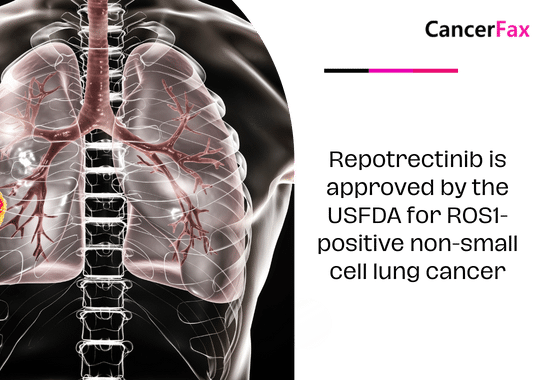Repotrectinib is approved by the USFDA for ROS1-positive non-small cell lung cancer
The Food and Drug Administration authorized repotrectinib (Augtyro, Bristol-Myers Squibb Company) for locally advanced or metastatic ROS1-positive non-small cell lung cancer (NSCLC) on November 15, 2023.
This FDA approval is the first to encompass patients with ROS1-positive NSCLC who have previously been treated with a ROS1 tyrosine kinase inhibitor (TKI), as well as individuals who have not had TKI treatment before.
The approval was granted following the TRIDENT-1 clinical trial (NCT03093116), a global study including many centers, with a single-arm, open-label design, and various patient cohorts with ROS1-positive locally progressed or metastatic NSCLC. The effectiveness was assessed in 71 ROS1 TKI-naïve patients who had undergone a maximum of 1 previous line of platinum-based chemotherapy and/or immunotherapy, and in 56 patients who had received 1 previous ROS1 TKI without prior platinum-based chemotherapy or immunotherapy.
The primary efficacy measures were the overall response rate (ORR) and duration of response (DOR) based on RECIST v1.1 as evaluated by an impartial central review. Confirmed Objective Response Rate (ORR) was 79% (95% CI: 68, 88) in the group of patients who had not had treatment with a ROS1 TKI before, and 38% (95% CI: 25, 52) in patients who had received prior treatment with a ROS1 inhibitor. The median duration of response was 34.1 months (95% CI: 25.6, not evaluable) and 14.8 months (95% CI: 7.6, not evaluable) in the two groups, respectively. Observations were made in cerebral lesions of patients with quantifiable central nervous system metastases, as well as in individuals with resistance mutations after tyrosine kinase inhibitor therapy.
The most frequent adverse responses, occurring in over 20% of cases, were dizziness, dysgeusia, peripheral neuropathy, constipation, dyspnea, ataxia, exhaustion, cognitive problems, and muscular weakness.
The suggested repotrectinib dosage is 160 mg taken orally once a day, with or without meals, for 14 days. Afterward, the dosage should be increased to 160 mg taken twice a day until disease progression or intolerable toxicity.
Susan Hau is a distinguished researcher in the field of cancer cell therapy, with a particular focus on T cell-based approaches and cancer vaccines. Her work spans several innovative treatment modalities, including CAR T-cell therapy, TIL (Tumor-Infiltrating Lymphocyte) therapy, and NK (Natural Killer) cell therapy.
Hau's expertise lies in cancer cell biology, where she has made significant contributions to understanding the complex interactions between immune cells and tumors.
Her research aims to enhance the efficacy of immunotherapies by manipulating the tumor microenvironment and exploring novel ways to activate and direct immune responses against cancer cells.
Throughout her career, Hau has collaborated with leading professors and researchers in the field of cancer treatment, both in the United States and China.
These international experiences have broadened her perspective and contributed to her innovative approach to cancer therapy development.
Hau's work is particularly focused on addressing the challenges of treating advanced and metastatic cancers. She has been involved in clinical trials evaluating the safety and efficacy of various immunotherapy approaches, including the promising Gamma Delta T cell therapy.
- Comments Closed
- March 3rd, 2024






Augtyro for NSCLC, FDA-approved lung drugs 2024, Next-gen tyrosine kinase inhibitor, Precision oncology advance, Repotrectinib approval, ROS1 fusion therapy, ROS1+ NSCLC breakthrough, TKI-resistant lung cancer
CancerFax is the most trusted online platform dedicated to connecting individuals facing advanced-stage cancer with groundbreaking cell therapies.
Send your medical reports and get a free analysis.
🌟 Join us in the fight against cancer! 🌟
Привет,
CancerFax — это самая надежная онлайн-платформа, призванная предоставить людям, столкнувшимся с раком на поздних стадиях, доступ к революционным клеточным методам лечения.
Отправьте свои медицинские заключения и получите бесплатный анализ.
🌟 Присоединяйтесь к нам в борьбе с раком! 🌟